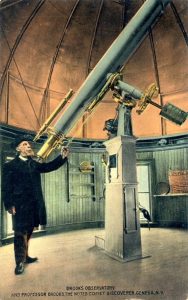King of the Comet-Finders: The Legacy of William R. Brooks
(From December 1996 Historical Society Newsletter)
For anyone interested in the science of astronomy, Dr. William R. Brooks should be a familiar name. Brooks has been accredited as one of the most influential astronomers of his time. His achievements are memorialized today by the Brook’s Observatory here in Geneva.
Dr. Brooks was born in Maidstone, England in 1844. His father was Baptist minister. When he was 13, his family moved to the United States and settled in Darien, New York. Around this time, Brooks became keenly interested in astronomy, no doubt enhanced by his observations of sailors who made sextant readings of the sun and stars. A year later he constructed a rather crude telescope from which he observed Donati’s Comet.
While he continued perfecting his telescopes, he also began lecturing on astronomy at the age of 16, giving his first lecture in his father’s church. Later, as a young adult, Brooks exhibited talent as a mechanical draughtsman securing positions at both Shepard Iron Works in Buffalo, and Corliss Steam Engine Company.
In 1870, he married Mary E. Smith and settled in Phelps. Here, he began a career in photography. However, Brooks longed for his first love—astronomy and using his skills in photography soon devoted all his time to the study of the heavens. In 1881, he fashioned the “Red House Observatory” which consisted of nothing more than a wooden floor and telescope. Yet it was from this crude observatory that Brooks witnessed his first comet.
It was the first of his many sightings. By the end of his life Brooks observed 30 comets, of which 21 are named after him. In fact, 1912 was a landmark for Brooks as he set a world record for comet-finding. Brooks moved to Geneva at the age of 44 and through the financing of a wealthy Geneva nurseryman, William Smith, the famous Brooks Observatory was constructed. During the remainder of his life, Brooks began teaching astronomy at both Hobart and William Smith Colleges. He was a Fellow member of the Royal Astronomical Society and American Association for the Advancement of Science.
Despite Brooks’ countless contributions to science, his death on May 3, 1921, was barely noted in the journals of astronomy—the very people which owed him the most recognition. Nevertheless, his achievements as a leading pioneer in astronomy would later be remembered and with it the well deserved title bestowed on him by a Chicago newspaper, “Dr. William Brooks—King of the Comet Finders.”
Explore Dr. Brooks’ life further through Comet Finder. now on view at the Geneva History Museum through April 13.


Dr. Brooks was a genius of his time.
Good for Geneva history and to have his observatory.
Thanks for the blog.
Another great astronomer was Leslie Peltier from Delphos Ohio. He was famous for discovering 12 comets, where as Dr. Brooks only discovered 11.